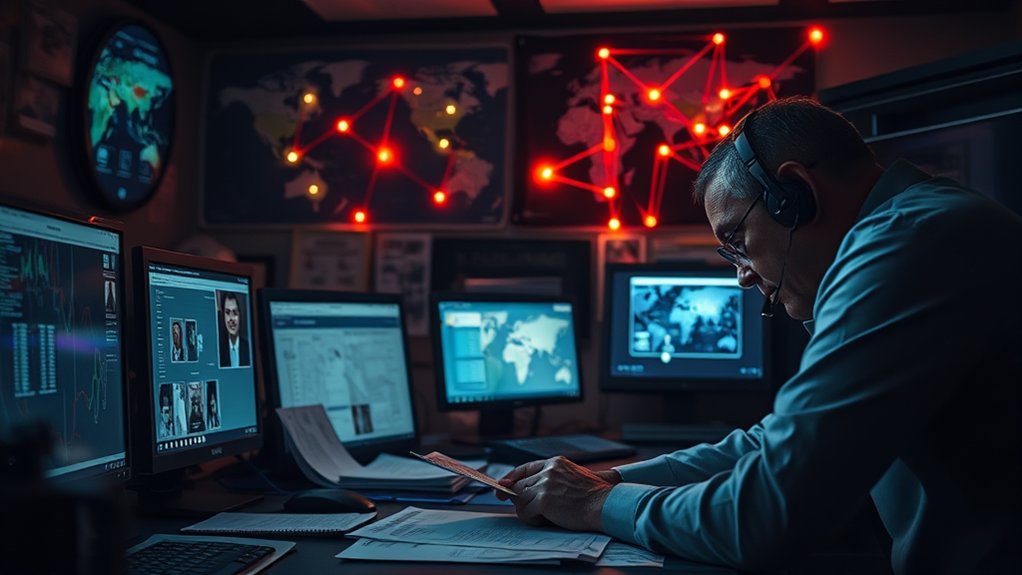Private investigators track parental abductions through systematic evidence gathering and digital surveillance techniques. They collect documentation, conduct interviews, and analyze surveillance footage while monitoring social media activity, financial transactions, and digital communication patterns. Investigators coordinate with law enforcement agencies and legal teams across jurisdictions, utilizing specialized databases and international networks. Their thorough approach combines traditional detective work with advanced technology, revealing complex patterns that illuminate the path forward.
Key Takeaways
- Private investigators gather evidence through photographs, court documents, interviews, and surveillance footage to establish patterns and potential leads.
- Digital surveillance tracks online activities, social media, email headers, and IP addresses to trace the abducting parent’s movements.
- Financial monitoring analyzes credit cards, bank statements, digital payments, and recurring expenses to identify location patterns.
- Cross-border coordination with law enforcement, embassies, and international organizations helps track individuals across different jurisdictions.
- Investigators maintain communication channels between stakeholders while documenting evidence for legal proceedings and potential court testimony.
Initial Steps and Evidence Gathering

When a parental abduction is reported, private investigators immediately begin collecting essential documentation, including recent photographs, court orders, custody agreements, and communication records between the involved parties. They conduct initial interviews with the reporting parent, family members, teachers, neighbors, and other potential witnesses who may have relevant information about the child’s disappearance.
Investigators carefully document all details surrounding the abduction, including the last known location, time of disappearance, and any vehicles involved. Evidence preservation becomes vital during these early stages, with investigators securing surveillance footage, phone records, credit card transactions, and social media activity. They also work to establish patterns in the abducting parent’s behavior, gathering information about their financial resources, known associates, and possible destinations where they might seek refuge. Licensed private investigators ensure all evidence is collected lawfully and ethically to support potential court proceedings.
Digital Surveillance and Social Media Tracking
Modern private investigators leverage sophisticated digital surveillance techniques to track parental abductions across virtual spaces. By monitoring digital footprints and analyzing online behavior patterns, investigators can piece together essential location data and movement histories of abducting parents.
| Platform Type | Key Data Points | Investigation Methods |
|---|---|---|
| Social Media | Check-ins, Photos | Geolocation analysis |
| Email Services | IP addresses | Digital forensics |
| Shopping Sites | Purchase records | Transaction tracking |
| Mobile Apps | Usage patterns | Device triangulation |
Investigators carefully track social media activity, examining shared photos for metadata, location tags, and timeline patterns. They monitor digital payment trails through e-commerce platforms and analyze email headers for IP addresses. Advanced software tools help compile and cross-reference this data, creating thorough digital surveillance profiles that often reveal essential patterns in the abductor’s movements and connections. Data protection laws must be carefully followed while gathering social media evidence to ensure the investigation remains legally compliant and admissible.
Financial Trail Investigation Methods
Nearly every financial transaction leaves a traceable footprint that private investigators can follow to locate abducting parents and their children. Investigators meticulously analyze credit card purchases, ATM withdrawals, and bank statements to establish financial patterns that reveal an abductor’s location and movement.
Transaction analysis extends beyond traditional banking, encompassing digital payment platforms, wire transfers, and cryptocurrency exchanges. Investigators examine recurring expenses like utility bills, rent payments, and school tuition that can pinpoint where a parent has relocated with a child. They also monitor online shopping deliveries, travel bookings, and subscription services that create digital paper trails.
When abducting parents attempt to conceal their financial activities, investigators can still track indirect spending through relatives, new romantic partners, or shell accounts that may be supporting them. Private investigators leverage their access to professional databases and law enforcement contacts to uncover financial activities not visible through standard public searches.
Cross-Border Search Strategies

Private investigators leverage an intricate network of international resources when tracking parental abductions across national borders. Through inter country treaties and established protocols, investigators navigate complex legal frameworks while maintaining rigorous documentation of their search efforts across jurisdictions.
- Investigators coordinate with local law enforcement agencies, embassy officials, and international organizations to establish search parameters within each country’s legal boundaries
- Cultural considerations notably influence search strategies, requiring investigators to adapt their approach based on local customs, languages, and social norms
- Specialized databases, immigration records, and border crossing data are systematically analyzed while maintaining compliance with international privacy laws and information-sharing agreements
This methodical approach enables investigators to maintain search continuity while respecting sovereignty and legal requirements of each involved nation. Advanced digital forensics technology proves crucial for recovering electronic evidence and tracking digital footprints across borders.
Working With Law Enforcement and Legal Teams
Successful parental abduction investigations require seamless collaboration between private investigators, law enforcement agencies, and legal teams. Private investigators maintain regular communication with police departments, sharing critical evidence and intelligence while respecting jurisdictional boundaries. They also work closely with attorneys to guarantee their investigative methods comply with legal considerations and admissibility requirements.
This collaborative approach involves coordinated efforts between multiple parties. Private investigators often serve as liaisons, bridging communication gaps between law enforcement, legal counsel, and left-behind parents. They assist in preparing documentation for court proceedings, provide sworn testimony when required, and help attorneys understand technical aspects of the investigation. Regular case reviews with all stakeholders guarantee alignment of objectives and prevent duplication of efforts while maximizing resources in the search for abducted children. The advanced technology resources utilized by private investigators enhance their ability to track and locate abducted children while maintaining legal compliance.
Advanced Technology and Tools in Child Recovery
Modern technology has revolutionized how investigators track parental abductions, expanding the toolkit for locating missing children beyond traditional surveillance methods. Investigators now employ sophisticated digital solutions that enhance their ability to locate and recover abducted children efficiently.
- GPS tracking devices can be strategically deployed on vehicles, belongings, or through mobile devices, providing real-time location data to investigators
- Advanced drone surveillance systems offer aerial monitoring capabilities, particularly useful in rural areas or when tracking movement across large distances
- Social media monitoring tools and digital forensics software help trace online activities, communications, and financial transactions
These technological advances enable investigators to gather essential intelligence while maintaining discretion. When combined with traditional investigative techniques, these tools greatly increase the success rate of reuniting children with their custodial parents. Licensed private investigators utilize state-of-the-art covert systems and surveillance technology to produce court-admissible evidence in child recovery cases.
International Network Coordination

Many parental abduction cases cross international borders, requiring investigators to coordinate with a complex network of law enforcement agencies, legal authorities, and fellow investigators worldwide. With their over 50 years of combined investigative experience, Stillinger Investigations has developed extensive protocols for handling sensitive cross-border cases.
| Network Entity | Role | Geographic Coverage |
|---|---|---|
| Interpol | Case coordination | Global |
| Local Police | Ground investigation | City/Regional |
| Embassy Officials | Legal liaison | Country-specific |
| Private Investigators | Case management | Multi-jurisdictional |
| NGO Partners | Support services | International |
The success of international cooperation hinges on maintaining secure communication channels, sharing real-time intelligence, and maneuvering through diverse legal frameworks. Investigators establish protocols for evidence handling across jurisdictions while managing cultural and language barriers. They utilize specialized case management systems to track leads, document communications, and coordinate recovery efforts with overseas partners. This systematic approach guarantees that all stakeholders remain aligned while respecting international laws and treaties governing child abduction cases.
Frequently Asked Questions
How Much Does It Typically Cost to Hire a PI for Parental Abductions?
Private investigators typically charge $75-150 per hour for investigation fees. A parental abduction case’s cost breakdown ranges from $3,000-10,000, depending on complexity, duration, and required travel expenses.
What Happens if the Abducting Parent Discovers They’re Being Tracked?
When tracking methods are discovered, abducting parents may flee, destroy evidence, or seek legal intervention. This can complicate investigations and affect parental rights determinations in custody proceedings.
Can Private Investigators Legally Access Sealed Custody Court Documents?
Private investigators cannot obtain legal access to sealed custody documents without proper court authorization. Only attorneys, court officials, and involved parties with legitimate rights can view these confidential records.
Do PIS Need Special Certifications to Handle International Parental Abduction Cases?
While standard private investigator licensing requirements apply, international parental abduction cases often demand specialized certifications, advanced investigator qualifications, and familiarity with international laws and child recovery protocols.
What Percentage of Parental Abduction Cases Are Successfully Resolved by Private Investigators?
Thorough case statistics for PI success rates in parental abduction cases are not widely published. Available data suggests investigation success varies considerably, with estimates ranging between 45-65% for resolved cases.
Conclusion
Successful recovery of abducted children requires a coordinated, multi-faceted approach combining technological tools, established investigative methods, and extensive professional networks. Private investigators must maintain meticulous documentation while traversing complex legal jurisdictions and collaborating with law enforcement agencies. Through systematic digital surveillance, financial tracking, and cross-border intelligence gathering, investigators can effectively locate missing children and facilitate their safe return to custodial parents.






